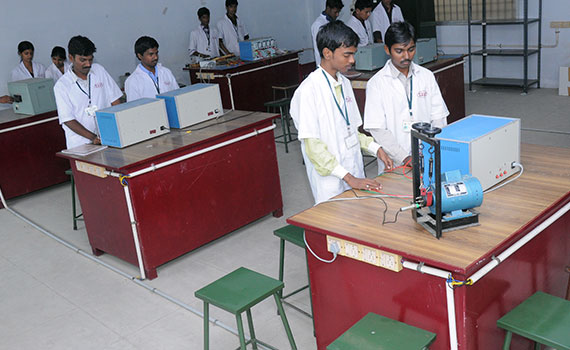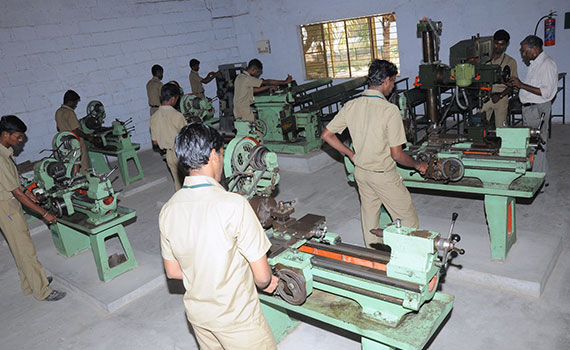

The Department of Mechanical Engineering was established in the year 1995. The department trains the students with the help of well qualified, dedicated and experienced faculty members and modern laboratories.
“To meet the expectations of the industry by providing quality education and to build professional mechanical engineers for matching the technological advancements”
The B.E. Mechanical Engineering was started in the year 1995. The students are taught the fundamental concepts of Thermal Science and Engineering, Manufacturing Engineering and Metallurgical Engineering. They are further trained towards cutting edge technologies like Computational Fluid Mechanics, Computer Aided Manufacturing, Computer Aided Design, Metrology and Measurements, Statistical Techniques in Modern Manufacturing, Finite Element Software Analysis & Methods, Industrial Heat Transfer, Design of Machine Elements, Design of Transmission System, Kinematics & Dynamics of Machine, etc.
Apart from the regular curriculum, to make the students competent and ethical professionals in Engineering & Technology various visiting professors from reputed corporate companies and pioneer institutions are invited as Guest Lecturers. Such training will enhance the placement of students in corporate companies & IT industries.
PEO 1: To prepare students to solve problems in mechanical engineering and related areas by thorough training in methods of engineering analysis, computation and experimentation, including understanding basic mathematical and scientific principles.
PEO 2: To practice professionally in the fields of industrial and manufacturing engineering through the provisions of high quality education and to pursue higher education.
PEO 3: To make the students aware of the culture in which they are slated to become leaders including understanding of the ethical and professional responsibilities of an engineer.
Program Outcomes of UG Mechanical Engineering
1. Mechanical Engineers explore the knowledge and the principles of science, mathematics, and engineering, in order to have strong foundations in engineering practice.
2. Mechanical Engineers identify, formulate, and solve practical problems, making use of appropriate technology.
3. Mechanical Engineers will develop the ability to design and conduct experiments as well as interpret, analyze data and report results
4. Mechanical Engineers acquire an ability to identify, formulate and solve engineering problems
5. Mechanical Engineers will develop and practice the skills to use modern engineering tools, and equipment to analyze problems.
6. Mechanical Engineers understand the impact of engineering solutions in a global, economic, environmental, and societal context.
7. Mechanical Engineers will develop an engineering product with utmost safety criteria in order to safeguard the environment.
8. Mechanical Engineers will understand the ethical responsibility and they will identify the professional ethical code to be followed by the professional.
9. Mechanical Engineers develop the skill of working in a multi-disciplinary team.
10. Mechanical Engineers explore in communicating effectively in both verbal and written forms.
11. Mechanical Engineers will develop confidence for self and lifelong learning.
12. Mechanical Engineers understand the various functions of management and business practices, such as managing a project and to develop entrepreneurial skills.
The M.E. Computer Aided Design was started in the year 2011. The Computer-Aided Design Technology program at Thangavelu Engineering College is best known for its reputation of placing students into a job market where there are more jobs than college graduates to fill them. Graduates are sought for their comprehensive knowledge base that includes contemporary CAD methods reinforced with traditional manual methods. CAD management skills are increasingly being emphasized.
Quality assurance research reveals course retention rates in the program average over 90%.
The Thangavelu Engineering College CAD Technology Program has an outstanding curriculum with articulation agreements with most major state universities. Students should download syllabi from the departmental web site's syllabi page and ask the intended university of transfer for an evaluation before taking the course at Thangavelu Engineering College. Students who plan to attend 4 year colleges of architecture and engineering are increasingly expected to know CAD system operations before attendance.
The Thangavelu Engineering College CAD Technology Program regularly offers online courses in both Descriptive Geometry and Geometric Dimensioning and Tolerancing each year. Students in these courses may opt to attend every class session or complete the course entirely online. Additionally, students may complete these two courses by CAD or manual methods.
Department of Mechanical Engineering is well equipped with modern class rooms for teaching & state of art laboratory facilities for practice.
A good mixture of well qualified and dedicated faculty members from various disciplines such as thermal science, energy engineering, manufacturing engineering, plastic technology, industrial engineering and design engineering etc., are available in the department.
Department is rigorously motivating its faculty and students towards possible Research and development in various existing potential regions which will be fruitful to the society & deployed one dedicated faculty for the R&D purpose.

The Department is well equipped with state-of-the art laboratories and infrastructural facilities in all the thrust areas. Students get a wide exposure and practical hands on training in the sophisticated equipment during their lab sessions.
Department Library is well established with large volume of books including both national and international authors.

Industrial Visits are organized to facilitate the students to acquire practical knowledge and first hand assessment of various process.
Some of the Industries students visited are: